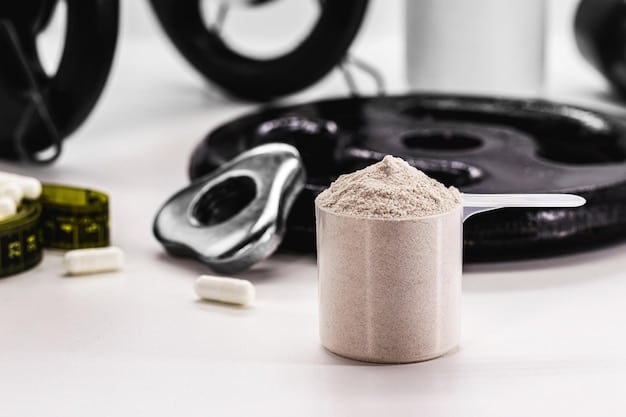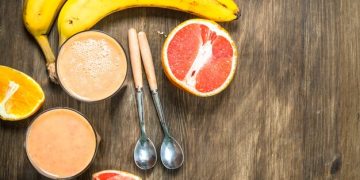The 6-Meal-A-Day Bodybuilding Nutrition Plan: Maximize Nutrient Absorption for Optimal Growth

The 6-meal-a-day bodybuilding nutrition plan aims to optimize muscle growth and recovery by maximizing nutrient absorption through frequent, smaller meals, ensuring a consistent supply of essential macronutrients and micronutrients to fuel intense training and minimize catabolism.
Embarking on a journey to sculpt a stronger, more defined physique often involves meticulous attention to both training and nutrition, with The 6-Meal-A-Day Bodybuilding Nutrition Plan: Maximize Nutrient Absorption for Optimal Growth emerging as a time-tested strategy for many athletes.
The Core Philosophy of Frequent Feeding for Bodybuilding
The concept behind a 6-meal-a-day bodybuilding nutrition plan is rooted in the belief that smaller, more frequent meals can optimize nutrient delivery and utilization, ultimately leading to superior muscle protein synthesis and reduced muscle breakdown. This approach moves away from the traditional three-large-meals-a-day model, advocating for a steady trickle of fuel to the body’s metabolic engine. It’s about maintaining an anabolic state throughout the day, minimizing periods where the body might resort to breaking down muscle tissue for energy.
Understanding Nutrient Absorption and Anabolism
The human body’s ability to efficiently absorb nutrients from food is not limitless. While the digestive system is incredibly robust, there’s an optimal rate at which it can process and absorb macronutrients like proteins, carbohydrates, and fats. Consuming very large meals can sometimes lead to less efficient absorption of certain nutrients, especially protein, as the body struggles to process the sheer volume simultaneously. Smaller, more frequent meals can theoretically improve absorption efficiency, ensuring more of the ingested nutrients are actually utilized for muscle repair and growth. Furthermore, frequent feeding helps to keep blood amino acid levels elevated, which is crucial for stimulating continuous muscle protein synthesis (MPS). This constant supply of building blocks signals the body to prioritize
muscle building processes, an anabolic state essential for bodybuilders.
Preventing Catabolism and Fueling Performance
Beyond optimizing anabolism, frequent feeding is also a powerful strategy for preventing catabolism, the breakdown of muscle tissue. When the body goes for extended periods without food, particularly after intense training, it can enter a catabolic state where it taps into muscle protein for energy. By consistently supplying nutrients, especially carbohydrates and proteins, the 6-meal-a-day plan helps to maintain stable blood sugar levels and provide a readily available energy source, thus preserving muscle mass. This consistent energy supply also directly impacts training performance, ensuring muscles are adequately fueled for intense workouts and recovery begins almost immediately post-exercise. This continuous nutrient flow is vital not just for recovery but for sustaining high energy levels throughout the day, necessary for demanding training schedules.
Crafting Your Macronutrient Ratios for Gains
The success of any bodybuilding nutrition plan hinges on precise macronutrient allocation. For a 6-meal-a-day approach, this means strategically distributing your protein, carbohydrates, and fats across those smaller meals to support muscle growth, energy levels, and recovery. The specific ratios can vary based on individual metabolism, training intensity, and goals (e.g., bulking vs. cutting), but general guidelines exist.
Protein: The Cornerstone of Muscle Growth
Protein is unequivocally the most critical macronutrient for muscle repair and growth. In a 6-meal-a-day plan, the goal is to hit your daily protein target by distributing it evenly across each meal. This ensures a constant supply of amino acids, the building blocks of muscle. A common recommendation for bodybuilders is to consume around 1 gram of protein per pound of body weight, or even slightly higher during intense training phases. For example, a 200-pound bodybuilder would aim for 200 grams of protein daily, meaning roughly 33-35 grams per meal if divided equally.
- Lean Meats: Chicken breast, turkey, lean beef (sirloin, round).
- Fish: Salmon, cod, tuna (rich in omega-3s).
- Eggs: Whole eggs or egg whites.
- Dairy: Greek yogurt, cottage cheese, whey protein.
Each meal should center around a high-quality protein source to maximize muscle protein synthesis.
Carbohydrates: Fueling Workouts and Glycogen Stores
Carbohydrates are the body’s primary energy source, essential for high-intensity training and replenishing muscle glycogen stores. In a 6-meal plan, carbohydrate intake should be carefully timed around workouts to provide immediate energy and aid in post-exercise recovery. Complex carbohydrates are preferred for sustained energy release. The amount will depend on your activity level and goals. For bulking, carbohydrates will be higher, while for cutting, they will be more moderate.
- Complex Carbs: Oats, brown rice, quinoa, sweet potatoes.
- Simple Carbs (post-workout): Fruit, white rice, dextrose.
Timing is crucial: a source of complex carbs before a workout provides lasting energy, and a mix of simple and complex carbs post-workout helps to quickly replenish glycogen and aid recovery.
Healthy Fats: Hormonal Balance and Overall Health
While protein and carbohydrates often take center stage, healthy fats are vital for hormone production, nutrient absorption, and overall health. They are also a dense source of energy. Fats should be included in most meals but in moderation due to their high caloric density. Aim for sources that provide essential fatty acids.
- Monounsaturated Fats: Avocados, olive oil, nuts.
- Polyunsaturated Fats: Fatty fish (salmon, mackerel), flaxseeds, walnuts.
- Saturated Fats: Red meat, coconut oil (in moderation).
Distributing healthy fats throughout your day, particularly with meals containing fat-soluble vitamins, helps optimize absorption and supports numerous bodily functions critical for a bodybuilder’s progress.
Optimizing Meal Timing and Frequency
The backbone of the 6-meal-a-day plan lies in its meticulous timing and consistent frequency. This isn’t just about *what* you eat, but *when* you eat it. The goal is to create a constant, anabolic environment, preventing catabolism and ensuring your muscles always have the necessary building blocks readily available. Spreading meals evenly throughout your waking hours is key to maximizing nutrient absorption and keeping your metabolism humming.
The Science Behind Nutrient Timing
The concept of nutrient timing in bodybuilding suggests that consuming specific macronutrients at particular times can enhance performance, recovery, and hypertrophy. While some aspects of nutrient timing are still debated, the principle of having protein and carbohydrates around your training window is widely accepted. For a 6-meal plan, this means strategically placing your most significant carbohydrate and protein meals pre- and post-workout to fuel your sessions and kickstart repair processes. This immediate nutrient supply after strenuous exercise capitalizes on what is often referred to as the “anabolic window,” a period when muscles are particularly receptive to nutrient uptake for repair and growth.

Structuring Your Day: A Sample Meal Schedule
A typical 6-meal schedule might involve eating every 2.5 to 3 hours, starting shortly after waking up and continuing until an hour or two before bedtime. This consistent rhythm helps regulate blood sugar levels, manage hunger, and maintain a steady flow of amino acids into the bloodstream.
- Meal 1 (Breakfast): Complex carbs, lean protein (e.g., oatmeal with whey protein and berries).
- Meal 2 (Mid-morning snack): Protein shake or cottage cheese with fruit.
- Meal 3 (Lunch): Lean protein, complex carbs, vegetables (e.g., chicken breast, brown rice, broccoli).
- Meal 4 (Pre-workout): Moderate protein, moderate complex carbs (e.g., turkey slices on whole-wheat bread).
- Meal 5 (Post-workout): Fast-digesting protein, simple/complex carbs (e.g., whey protein shake with banana and white rice).
- Meal 6 (Before bed): Slow-digesting protein, healthy fats (e.g., casein protein, Greek yogurt with nuts).
This structured approach not only ensures consistent nutrient availability but also trains your body to expect nourishment at regular intervals, which can help optimize digestive function and nutrient assimilation over time. Adjustments will inevitably be needed based on individual sleep patterns, workout schedules, and daily routines, but the core principle of frequency remains.
Hydration and Micronutrients: Often Overlooked Pillars
While protein, carbohydrates, and fats receive much attention in bodybuilding nutrition, the roles of hydration and micronutrients (vitamins and minerals) are equally, if not more, critical for optimal performance, recovery, and overall health. These elements act as catalysts for countless bodily functions, including metabolism, nerve function, muscle contraction, and immune response, all of which are vital for a successful bodybuilding journey. Neglecting them can impede progress despite a perfectly structured macronutrient plan.
The Indispensable Role of Water
Water constitutes a significant portion of our body weight and is involved in every metabolic process. For bodybuilders, adequate hydration is paramount for several reasons:
- Nutrient Transport: Water is the medium through which nutrients are transported to cells and waste products are removed. Without sufficient water, the delivery of essential amino acids and glucose to muscle cells cannot be optimized.
- Joint Lubrication: It lubricates joints, reducing friction and the risk of injury during intense weightlifting sessions.
- Temperature Regulation: Water helps regulate body temperature, particularly crucial during strenuous workouts where the body generates significant heat.
- Performance: Even slight dehydration can lead to a significant drop in strength, endurance, and overall performance. Muscle cells that are well-hydrated are more anabolic.
Aim to drink at least 1 gallon (approximately 3.7 liters) of water daily, increasing intake during workouts and hot weather. Don’t wait until you’re thirsty; consistent sips throughout the day are more effective.
Micronutrients: The Unsung Heroes
Vitamins and minerals, though required in smaller quantities, are indispensable for muscle growth and recovery. They participate in biochemical reactions that convert food into energy, build and repair tissue, and maintain immune function.
- B Vitamins: Crucial for energy metabolism, helping convert carbohydrates, fats, and proteins into usable fuel.
- Vitamin D: Essential for bone health, immune function, and potential roles in muscle strength and testosterone production.
- Magnesium: Involved in over 300 biochemical reactions, including muscle and nerve function, blood glucose control, and blood pressure regulation. Often depleted in athletes.
- Zinc: Important for immune function, protein synthesis, and maintaining healthy testosterone levels.
- Iron: Necessary for oxygen transport in the blood and muscles, impacting endurance and energy levels.
- Potassium: Critical for fluid balance, nerve signals, and muscle contractions, working closely with sodium.
A diverse diet rich in fruits, vegetables, whole grains, and lean proteins should ideally provide most micronutrients. However, due to increased demands from intense training and potential nutrient depletion in modern food production, some bodybuilders opt for a high-quality daily multivitamin-mineral supplement as an insurance policy. Prioritizing whole, unprocessed foods is the best strategy to ensure comprehensive micronutrient intake.
Supplements: Enhancing Your 6-Meal Strategy
While whole foods form the bedrock of any successful bodybuilding nutrition plan, strategic supplementation can bridge nutritional gaps and provide an extra edge for maximizing growth and recovery within a 6-meal-a-day framework. Supplements are precisely what their name implies: complements to an already solid diet, not replacements for real food. Their effectiveness is maximized when integrated into a well-structured eating plan, like the 6-meal daily approach.
Foundational Supplements for Bodybuilders
There are several categories of supplements that are widely recognized for their benefits in bodybuilding, directly supporting the goals of optimized nutrient absorption and muscle growth.
- Protein Powders: Whey, casein, and plant-based proteins are convenient ways to meet your high protein requirements, especially around workouts or when whole food options are not feasible. Whey is fast-digesting and ideal post-workout, while casein is slow-digesting, perfect before bed.
- Creatine Monohydrate: One of the most researched and effective supplements for increasing strength, power, and muscle mass by enhancing the body’s ability to produce energy rapidly during high-intensity exercise.
- Branched-Chain Amino Acids (BCAAs): Leucine, isoleucine, and valine are critical for muscle protein synthesis and can help reduce muscle breakdown during intense training. Often consumed pre- or intra-workout.
- Omega-3 Fatty Acids (Fish Oil): Important for overall health, reducing inflammation, and potentially aiding in recovery and joint health.
- Multivitamin/Mineral: As discussed, this acts as an insurance policy to ensure you’re getting all essential micronutrients that might be missed due to dietary strictures or increased physiological demands.
These supplements are not magic pills but tools to optimize specific physiological processes when your diet alone isn’t quite enough.

Timing and Integrating Supplements with Your Meals
The 6-meal-a-day structure naturally lends itself to optimal supplement timing. For instance, a fast-digesting whey protein shake can be seamlessly integrated into your post-workout meal, alongside fast-acting carbohydrates, to kickstart recovery. Creatine can be taken at any time of day, but consistently is key; some prefer it post-workout or split between meals. BCAAs are often consumed during workouts to support endurance and limit muscle breakdown. Omega-3s and multivitamins are best taken with meals to improve absorption.
Strategic supplementation within a frequent feeding plan ensures that your body has access to specific beneficial compounds when it needs them most, particularly around demanding training periods, further supporting muscle repair, growth, and overall performance. Always source supplements from reputable manufacturers and consult with a healthcare professional or qualified nutritionist before beginning any new supplement regimen.
Potential Challenges and How to Overcome Them
Adopting a 6-meal-a-day bodybuilding nutrition plan, while highly effective for many, comes with its own set of practical challenges. The commitment to frequent eating requires significant planning, discipline, and adaptability. Recognizing these hurdles beforehand and developing strategies to overcome them is crucial for long-term success and adherence to the plan.
Time Commitment and Meal Preparation
Perhaps the most significant challenge is the sheer time commitment required for meal preparation and consumption. Cooking, portioning, and packing six distinct meals daily can be daunting, especially with a busy schedule. This often leads to shortcuts, unhealthy choices, or even abandoning the plan altogether.
- Batch Cooking: Dedicate a few hours one or two days a week (e.g., Sunday) to cook staples like chicken, rice, and vegetables in large quantities.
- Meal Prepping Containers: Invest in high-quality, stackable meal prep containers to easily porton and store meals.
- Simple Recipes: Stick to simple, easy-to-prepare recipes that don’t require complex ingredients or techniques.
- Utilize Tools: Slow cookers, instant pots, and air fryers can significantly reduce active cooking time.
Thinking of meal prep as an integral part of your training—just as important as your gym sessions—can help frame it as a priority rather than a chore.
Social and Logistical Hurdles
Eating every 2.5-3 hours can be socially awkward or logistically difficult, particularly in professional or social settings where large, frequent meals are not the norm. Dining out, business lunches, or social gatherings can derail the plan.
- Portable Snacks: Always carry a small cooler or bag with pre-portioned snacks like protein bars, fruit, nuts, or a small protein shake.
- Strategic Restaurant Choices: When dining out, choose restaurants with healthy options that allow for customization (e.g., grilled protein, steamed vegetables).
- Communicate Your Needs: Politely explain your dietary needs to friends, family, or colleagues. Most people are understanding.
- Flexibility: While consistency is key, occasional minor deviations or slight adjustments to timing should not be seen as failures but as necessary adaptations for real life.
Planning ahead for social events and having a backup strategy can minimize disruptions and reduce stress.
Maintaining Consistency and Avoiding Burnout
The repetitive nature of a structured diet can lead to dietary fatigue or “burnout,” where the strictness of the plan becomes overwhelming. This can manifest as cravings, reduced adherence, or a complete abandonment of the nutrition strategy.
- Variety within Parameters: Rotate protein sources, carbohydrate types, and vegetable choices to keep meals interesting while sticking to your macronutrient goals.
- “Free Meals” or “Refeeds”: Incorporate
controlled
cheat meals or refeed days periodically (e.g., once a week or every two weeks) to provide a mental break and potentially boost metabolism, provided it aligns with your overall goals and doesn’t derail progress. - Track Progress, Not Just Food: Focus on the positive changes in your body composition, energy levels, and strength as motivation to continue.
- Seek Support: Connect with others who follow similar eating plans for moral support, recipe ideas, and shared experiences.
Overcoming these challenges requires a proactive mindset, careful planning, and a degree of flexibility. The key is to find a sustainable rhythm that fits your lifestyle, allowing you to reap the significant benefits of consistent, frequent nutrition for bodybuilding.
Adapting the 6-Meal Plan to Individual Needs
While the fundamental principles of the 6-meal-a-day bodybuilding nutrition plan remain consistent, its true power lies in its adaptability to individual needs, goals, and metabolic responses. No two bodybuilders are exactly alike, and what works optimally for one might need significant tweaks for another. Personalizing the plan ensures maximum effectiveness and sustainability.
Tailoring Macronutrients and Calories
The most significant area for individual adaptation is the precise allocation of calories and macronutrients. A baseline calculation of your Total Daily Energy Expenditure (TDEE) is the starting point, but this will need adjustment based on your specific goal:
- Bulking (Muscle Gain): Requires a caloric surplus. Gradually increase carbohydrates and, to some extent, fats, while maintaining high protein. The increase should be slow to minimize excessive fat gain.
- Cutting (Fat Loss): Demands a caloric deficit. Reduce carbohydrates and fats incrementally, but keep protein high to preserve muscle mass. This is where meticulous tracking becomes even more critical.
- Maintenance: Calories match TDEE, with balanced macronutrients to sustain current body composition.
Regularly assess your progress (weight, body composition, strength) and adjust macronutrient ratios and total calories every few weeks. Small, consistent adjustments are more effective than drastic changes.
Considering Dietary Restrictions and Preferences
The 6-meal plan must accommodate any dietary restrictions, allergies, or personal preferences.
- Vegetarian/Vegan: Focus on diverse plant-based protein sources like legumes, tofu, tempeh, quinoa, seitan, and plant-based protein powders. Ensure adequate intake of Vitamin B12, iron, zinc, and omega-3s, which can be challenging on a purely plant-based diet.
- Gluten-Free: Substitute gluten-containing grains (wheat, barley, rye) with gluten-free options like rice, quinoa, oats (certified GF), potatoes, and sweet potatoes.
- Allergies/Intolerances: Carefully identify and eliminate trigger foods. For example, if dairy is an issue, opt for lactose-free or plant-based alternatives for protein shakes and yogurts.
Successful adaptation means finding suitable alternative food sources that align with the plan’s macronutrient profile without causing adverse reactions or nutritional deficiencies. This requires research and careful label reading.
Lifestyle Integration and Flexibility
The practical application of the 6-meal plan must fit into your daily life without becoming an unbearable burden.
- Workout Schedule: Adjust meal timing to align perfectly with your pre- and post-workout nutrition windows. If you work out in the morning, your first few meals will be critical. If evening, then meals leading up to and immediately after will be key.
- Work Schedule: Consider bringing all your meals to work or identifying readily available healthy options nearby. Some professions make frequent eating challenging, necessitating more emphasis on portable liquid nutrition (shakes).
- Sleep Patterns: Ensure your last meal is timed appropriately to allow for proper digestion before sleep, but also minimizes overnight catabolism (e.g., slow-digesting protein).
Flexibility doesn’t mean deviation from the plan’s principles, but rather smart navigation within its framework. It’s about making the 6-meal-a-day bodybuilding nutrition plan work for *you*, rather than you working for the plan. This individualized approach is what transforms a generic strategy into a truly optimized path to achieving your bodybuilding goals.
| Key Aspect | Brief Description |
|---|---|
| 🍽️ Frequent Meals | Spreading daily calories into 6 smaller meals to maintain an anabolic state and optimize nutrient supply. |
| 💪 Macronutrient Balance | Careful distribution of protein, carbs, and fats to fuel training, recovery, and muscle synthesis. |
| 💧 Hydration & Micronutrients | Essential for metabolic functions, performance, and overall health, often complemented by supplements. |
| 🚀 Adaptability | Tailoring the plan to individual caloric needs, dietary preferences, and lifestyle for sustained success. |
Frequently Asked Questions
▼
While effective for many bodybuilders due to its focus on consistent nutrient supply, its suitability depends on individual goals, lifestyle, and metabolism. It requires significant commitment to meal preparation and timing. Those with busy schedules might find it challenging, but adaptations can be made for better adherence.
▼
The primary benefits include maximizing nutrient absorption, maintaining a consistent anabolic state to promote muscle growth and recovery, preventing muscle catabolism, stabilizing blood sugar levels, and potentially boosting metabolism. It ensures a steady supply of energy for intense training.
▼
Meal timing is crucial in the 6-meal-a-day plan, particularly around workouts. Consuming protein and carbohydrates before and immediately after training helps fuel performance, replenish glycogen stores, and kickstart muscle repair and protein synthesis. Consistent timing throughout the day supports steady energy levels and nutrient flow.
▼
Yes, supplements can strategically enhance the 6-meal-a-day plan. Protein powders are excellent for meeting high protein targets, especially post-workout. Creatine, BCAAs, omega-3s, and a multivitamin can also support recovery, performance, and overall health. They should complement, not replace, whole food nutrition.
▼
Common challenges include the time commitment for meal prep, social/logistical hurdles, and potential dietary burnout. Overcome these by batch cooking, using meal prep containers, carrying portable snacks, communicating your dietary needs, and incorporating variety within the plan or occasional “free meals” for mental breaks.
Conclusion
The 6-meal-a-day bodybuilding nutrition plan represents a comprehensive and highly effective strategy for those committed to maximizing muscle growth, optimizing nutrient absorption, and achieving peak physical conditioning. By consistently fueling the body with smaller, nutrient-dense meals, this approach fosters an environment conducive to anabolism while minimizing catabolism. While it demands meticulous planning, discipline, and attention to detail, the benefits—ranging from enhanced performance and accelerated recovery to consistent energy levels and improved body composition—underscore its enduring value in the world of bodybuilding. Adapting the core principles to individual needs and lifestyle ensures the plan remains sustainable and supports long-term success on your unique fitness journey.





